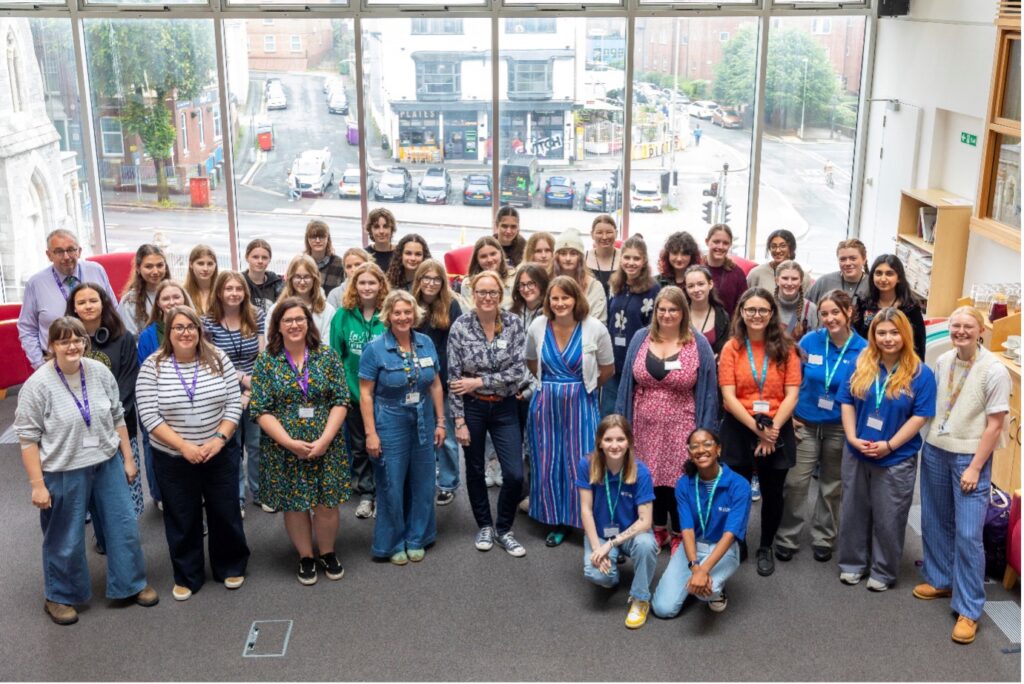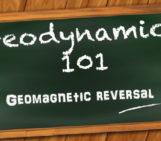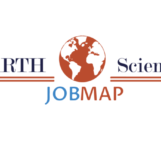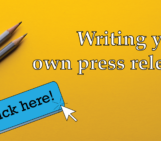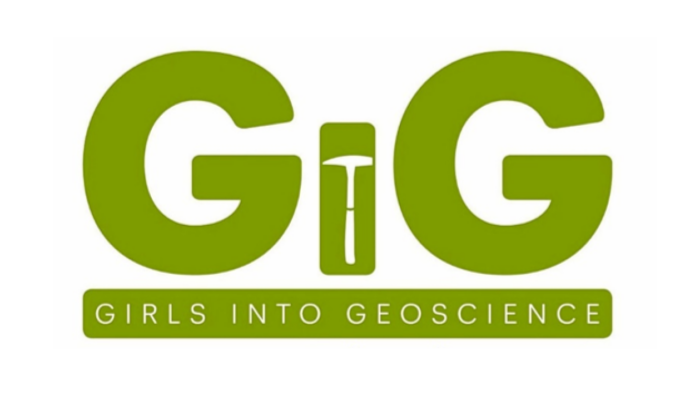
“Girls into Geoscience” is a UK-based outreach initiative aiming at encouraging female (and female identifying and non-binary) to pursue a career in Geosciences. I had the pleasure to interview the founders of this initiative, Prof. Sarah Boulton and Dr. Jodie Fisher, and discuss about their experiences, how the landscape of student recruitment has changed over the years and the challenges laying ahead for supporting women in Geosciences.
First, thank you so much for talking with us! Can you briefly explain what Girls into Geoscience is about?
Sarah: Girls into Geoscience is a 2-day outreach event run by academic, research and technical staff and students in the School of Geography, Earth and Environmental Sciences at the University of Plymouth, whcih aims to introduce female (and female identifying and non-binary) A-level students (17 – 18 years old) to the Geosciences. The aim is to break down barriers to inclusion, provide role modules and showcase the exciting world of Earth Sciences through a day field trip, short lectures from industry speakers and hands on workshops.
Why did you decided to start this initiative back in 2014? How has it expanded across the country since then?
Sarah: The were two key drivers to us starting this event. Firstly, a visiting student attending a university open day told us her teacher had said to her that ‘geology is not for girls’ and secondly the numbers of female students in the Geology programmes was below the national average. Amazingly, since then not only have the numbers of female studying nationally almost reached parity with males, that is also almost the case at Plymouth. We have been joined in this endeavour by sister events running in Scotland, Wales and Ireland (although Ireland is taking a slightly different approach now) and an event for younger girls at the University of Leicester.
a visiting student attending a university open day told us her teacher had said to her that ‘geology is not for girls’
After 10 years (and counting!), how has the landscape changed for women studying Geosciences?
Jodie: We have seen a big change certainly within our student numbers in Plymouth. When we stated GiG just 27% of our students identified as female. This academic year we welcomed our new students and nearly 50% of them identified as female. And this isn’t just at Plymouth nationally we are seeing a more even gender spread in our geoscience cohorts. Within industry some areas of geoscience still see a dominance in male geologists, but we hope as our geoscientists qualify and begin their industry journeys we will see a shift in these numbers too. As more women have entered the geoscience industries we are also seeing more support networks for women too, and this is something we hope will continue.
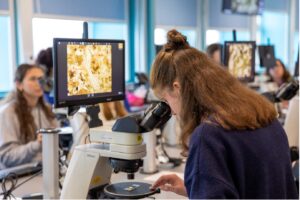
Participants have the opportunity to engage in hands-on workshops, experiencing the work of a geoscientist firsthand (credit: authors)
Organizing this event involves a lot of organization, including coordinating with schools, recruiting speakers across the country, and managing activities over two days. What have been the biggest challenges and most rewarding aspects over the years?
Jodie: it certainly does take some time and logistics. As one event finishes, we are already thinking about the following year and who might like to be involved in upcoming events. We have been so lucky with so many women wanting to be involved that we have never been short of speakers and people to run and lead the workshops and fieldwork. We also have a great network of teachers who support us sending girls to our events each year. Initially we thought small groups would come with teachers, but it became clear very early on that many girls wanted to come independently, and often were just 1 of a few girls doing geoscience at their school, or the only one interested in taking it further. This provided some challenges as most of the girls are under 18 so we had to ensure a safe environment for them, make sure parental and school consents were done in place, so that they could enjoy the independence of the event and get the most out of it. This led to us offering rooms in halls for the girls to have a space place to stay, but also to get a flavour of real university life.
This has also been the most rewarding aspect of the event. Girls coming independently discovered other girls just like them, interested in the same things, and looking to find out more. They formed bonds, what’s app groups and confidence in their subject and choices to do Geoscience. Hearing on the feedback forms how wonderful it was to meet other girls just like them really has shown us that GiG provides more than just an educational experience for the girls, and this is more than we ever could have imagined when we set GiG up.
GiG provides more than just an educational experience for the girls
Do you have any memorable anecdotes or special moments from the initiative that you’d like to share with us?
Sarah: There are many memorable moments, but I think the one that sticks out for me was on one the fieldtrips a few years ago two girls attending from different schools turned out to be long lost friends who hadn’t seen each other in several years. Their reunion on limestone was lovely!! Many of the students make friends during GiG and they renewed theirs! On a scientific note, it’s always great in the field, seeing young people get excited by rocks and develop and understanding of the wonder of our planet.
Jodie: For me it was during the COVID years where we ran events in 2020 and 2021 online with colleagues from GiG Ireland, Wales and Scotland. WOW! In 2020 we welcomed over 250 attendees had over 30 women contributing talks and workshops and it was amazing! My favourite part was at the end when I asked if instead of our usual annual group pic, we would like to take screenshots of all the attendees and would they mind turning on cameras to enable us to do this. The screen suddenly lit up with beaming faces smiling after a day of Q and A’s, virtual fieldtrips and workshops. It was AMAZING to see them all there, during such a difficult time, and that image will always really stick with me.
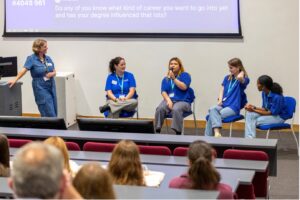
Other activities of the event include a Q&A pannel with current students at the University of Plymouth where participants get the chance to ask questions about their degree and life at the University (credit: authors)
What kind of feedback do you receive from students? How does their perception of a geoscientist’s daily life change after attending the event?
Sarah: The students love GiG! Over the years we’ve had almost 100% positive feedback with the vast majority of our guests saying that they would recommend the day to other students. We also see that significant proportions of the girls are planning to study an Earth Science subject at university, while many come to the event because they are interested these increases in our post event survey.
Jodie: over the years we have also added in pre surveys to understand how the girls feel about geoscience and studying university before the event. This helps us to understand how attitudes and values may have changed following attending GiG, and this has helped us to shape the event as we have gone on. Whilst we would love everyone to go on and study the geosciences attending the event can also raise confidence, aid understanding about what university is really like, and enable the girls to really see higher education as something that is available for them all to do.
On a personal point of view, why did you decided to study Geosciences?
Sarah: This is always a tricky question as it wasn’t just one thing! I’ve always loved sciences and I was good at those subjects at school but I also liked history and archaeology. I grew up in the country and family holidays were to Scotland and often involved going for countryside walks or going down mines. So when it came to picking a degree subject I wanted to study a science that combined these aspects – and geology was the perfect fit as it combines aspects of all the other sciences, has a historical element and involves lots of exciting travel and fieldwork. Plus I thought I’d probably be able to get a job as a geologist at the end of the day.
Jodie: I fell into Geology and never looked back. I studied Chemistry, Biology and Maths at A level and wasn’t sure what I wanted to do. I loved applying science and this led me to apply for archaeology. I didn’t get the maths grade I hoped and my chosen university (Leicester) instead offered me Geology. I thought I would give it a go and never looked back. It encompassed all I loved about science and brought it all together. It as the subject I never realised I was missing. I am still learning something new every day and I love the way geology underlies and links so many different subjects, I can be a marine biologist, a historian, a climate scientist and artist all in one day!
Looking ahead, what do you see as the future challenges and opportunities for recruiting more girls into geosciences and supporting women in the field across different career stages?
Sarah: On the one hand I’m really positive about the future opportunities, there have been many changes in UK HE since I’ve been lecturing that have had a massive impact and support female participation in the geosciences, for example more open conversations about periods and toilet facilities during fieldwork. But there is still a long way to go to ensure that women make it to the higher echelons of both academia and industry, so tackling the ‘leaky pipeline’ is a big issue. I also think that we cannot be complacent, and progress can easily be lost.
we cannot be complacent, and progress can easily be lost
Jodie: As Sarah said we have come a long way. Making geology more accessible for girls has been brilliant, and our male colleagues have really embraced this. As a geologist and a mother, it is still hard to juggle academia and a family, but it is getting better and I hope that this continues so the new generation don’t have to make the choices I had to make and realise the opportunities open to them. I hope this progress continues so we see more female professors and leaders across the geosciences, the people I work with certainly inspire me and I hope we can continue to inspire them.
NE: GiG2025 is taking place on July 7th-8th at University of Plymouth. More info on their website.

